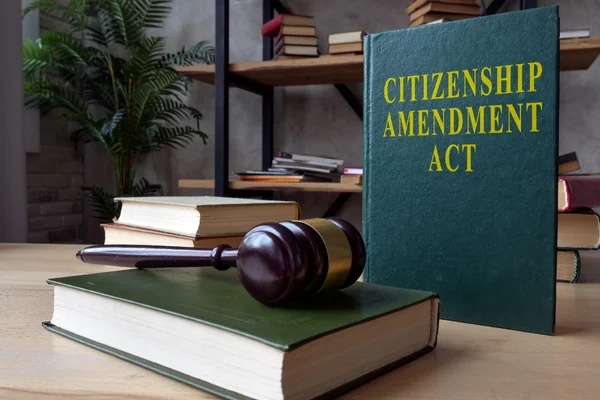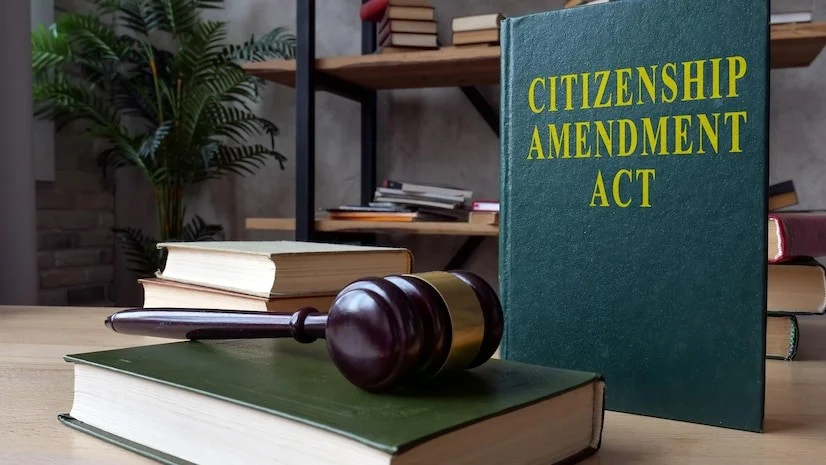The Ministry of Home Affairs recently notified the Citizenship (Amendment) Rules, 2024, for the implementation of the Citizenship Amendment Act, 2019.
What are the Citizenship Amendment Rules, 2024?
- The rules, in line with the 2019 amendment to The Citizenship Act, 1955, aim to provide citizenship to migrants from select neighboring countries of India.
- People from Hindu, Sikh, Buddhist, Jain, Parsi, or Christian communities who entered India before December 31, 2014, from Pakistan, Afghanistan, or Bangladesh are eligible to apply.
- An online system for application, processing, and grant of citizenship under the Citizenship Amendment Act (CAA) is being explored by the Home Ministry.
- Eligible applicants include individuals of Indian origin, spouses of Indian citizens, minor children of Indian citizens, individuals with registered Indian citizen parents, etc.
- It also includes Overseas Citizens of India Cardholders.
- Documents like Form VIIIA, an affidavit verifying the accuracy of information and attesting to the applicant’s character by an Indian citizen are required for citizenship by naturalization.
- Applicants must declare their proficiency in one of the languages specified in the Eighth Schedule to the Constitution of India.
Application process for citizenship:
- Under Section 6B of the Citizenship Act, 1955, applicants must follow a specific application process.
- It includes electronic submission of application to the Empowered Committee through the designated District Level Committee (DLC).
- Upon submission, applicants will receive an acknowledgement in Form IX, followed by document verification by the DLC.
- Applications shall have a declaration to the effect that the citizenship of his country shall stand renounced irrevocably, and not raise any claim on it in future.
- The designated officer administers the oath of allegiance to the applicant, after which the application and documents, are forwarded to the Empowered Committee.
- In case the applicant fails to appear in person for the oath-taking, the application will be refused by the Empowered Committee as recommended by DLC.
- Upon successful completion of the application, citizens will be provided digital certificates, and a hard copy if requested.
What is the Citizenship (Amendment) Act, 2019?
- It is a legislative enactment passed by the Parliament in 2019 to amend the Citizenship (Amendment) Act Rules of 1955.
- This allowed for Indian citizenship to religious minorities, who fled from Pakistan, Bangladesh, and Afghanistan due to religious persecution or fear, before December 2014.
- Religious minorities include Hindus, Sikhs, Buddhists, Jains, Parsis, and Christians.
- They are provided with the opportunity to apply for Indian citizenship, provided they meet certain conditions.
- Under the CAA 2019 amendment, migrants who entered India by December 31, 2014, were eligible for fast-track Indian citizenship.
- The amendment reduced the residence requirement for naturalization from 11 years to 5 years.
- The CAA is not aimed at any particular religious community from abroad but establishes a framework for migrants who might have been considered “illegal” otherwise.
Who is exempted from the Citizenship (Amendment) Act Rules?
- Autonomous councils created under the 6th Schedule of the Constitution are exempted from the purview of CAA.
- The law will not be implemented in most tribal parts of Northeastern states.
- Areas, where the Inner Line Permit (ILP) is required by people from other parts of the country in Northeastern states, are excluded from the law.
- The ILP is in place in parts of Arunachal Pradesh, Nagaland, Mizoram and Manipur.
Ref:Source
| UPSC IAS Preparation Resources | |
| Current Affairs Analysis | Topperspedia |
| GS Shots | Simply Explained |
| Daily Flash Cards | Daily Quiz |



